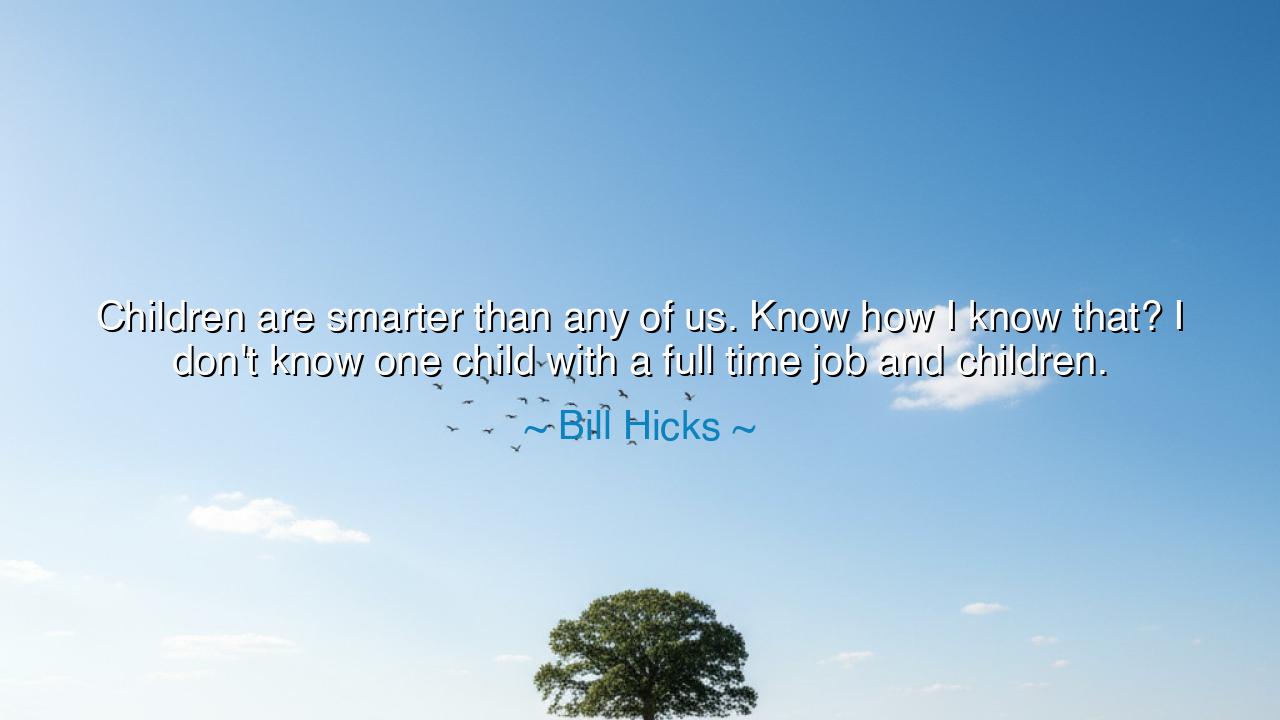
Children are smarter than any of us. Know how I know that? I
Children are smarter than any of us. Know how I know that? I don't know one child with a full time job and children.






In the sacred lineage of truth-tellers cloaked as jesters, the fiery philosopher of comedy Bill Hicks once declared: “Children are smarter than any of us. Know how I know that? I don’t know one child with a full-time job and children.” To those who hear only the laughter, it may seem a passing joke — a quick flicker of absurdity. But to those who listen with the soul, it is a revelation. Hicks, whose humor carried the gravity of prophecy, spoke not merely of children, but of the wisdom of innocence, the madness of adulthood, and the folly of a world that mistakes exhaustion for achievement. Beneath the laughter, his words are both mirror and warning — a reminder that what we call “maturity” is often the art of forgetting what truly matters.
The origin of this quote comes from Hicks’s lifelong crusade against the dull hypnosis of modern life. A man of deep insight disguised as a comedian, he saw that the world of adults had become a cage of labor and repetition — a cycle of working, spending, and worrying, so relentless that it left no room for wonder. In his eyes, the child was not the beginning of wisdom, but its fullest expression. For what is the essence of intelligence if not the ability to live freely, to find joy without possession, and to ask questions without fear? Hicks, with his caustic humor and spiritual vision, tore through the illusion of “grown-up” superiority and reminded his audience that the simplest beings often see the clearest truths.
Children, in his eyes, are untouched philosophers. They do not rush, yet they discover. They do not hoard, yet they are content. They live in the present moment — that elusive treasure adults spend fortunes to reclaim through therapy, travel, and distraction. Hicks’s jest about jobs and children is not mockery, but meditation. He saw in the adult’s endless striving a form of self-imposed slavery — a devotion to busyness that smothers creativity and kills joy. The child, unburdened by ambition or self-importance, lives as the ancients once advised: in harmony with life’s flow. Thus, the “smarter” one is not the one who earns the most, but the one who remembers how to play.
Consider the tale of Diogenes the Cynic, that wild philosopher of Greece who wandered barefoot and laughed at kings. When Alexander the Great stood before him and asked what he desired most, Diogenes replied, “Stand aside; you are blocking the sun.” Like Hicks, he mocked the madness of power and possession, preferring sunlight and freedom to wealth and duty. His simplicity made him appear foolish to the wise — just as the laughter of children seems trivial to those burdened by “important” things. But it is the same wisdom: to desire little, to live freely, to need nothing but the moment. In both Diogenes and Hicks, we hear the echo of the child — that divine simplicity which the world calls foolishness but which the soul knows as truth.
And yet, Hicks’s humor is not without sorrow. His line exposes the quiet tragedy of adulthood: that in our race to become successful, we lose the very qualities that make life worth living. We trade curiosity for control, laughter for anxiety, presence for planning. We scorn the child’s freedom while secretly longing for it. Hicks’s brilliance was to turn this sorrow into laughter — to awaken his listeners not through preaching, but through irony. When he says that children are smarter, he means that they have not yet forgotten how to live. They have not yet accepted the madness of endless striving as the natural order of things.
There is, too, a lesson of compassion here. For Hicks, who often raged against the machinery of society, the child was a symbol of the untamed spirit, the part of us that refuses to be broken by conformity. Each of us, he suggests, still carries that inner child — buried, perhaps, beneath schedules and responsibilities, but waiting to be rediscovered. His humor calls us back to that place of lightness, to the courage of simplicity. He invites us to remember that intelligence is not measured in accomplishments, but in awareness; not in what we control, but in how deeply we feel.
Therefore, O listener, let this teaching settle like rain upon your heart: do not mistake busyness for wisdom, nor exhaustion for purpose. The child who laughs is closer to truth than the adult who frets. The one who plays is not idle but alive. Work, yes — but let work serve life, not replace it. Dream, but do not forget to look up at the clouds. When you find yourself overwhelmed by the noise of the world, recall Hicks’s laughter and his simple wisdom: that life’s meaning is not in what we build, but in how freely we breathe while building it.
For in the end, the child’s smile — curious, unburdened, radiant — is the true light of intelligence. “Children are smarter than any of us,” Hicks said, and perhaps he was right. For they remember what the wise spend lifetimes trying to relearn: that joy is the only real measure of understanding, and that the smartest life is the one still capable of wonder.






AAdministratorAdministrator
Welcome, honored guests. Please leave a comment, we will respond soon